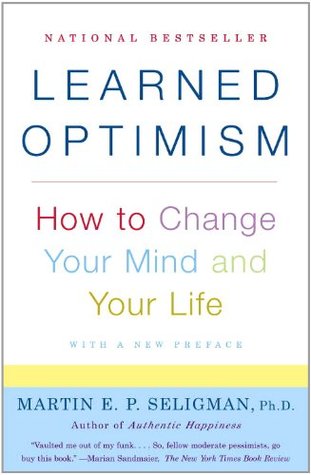More on this book
Community
Kindle Notes & Highlights
Maybe what looks like a symptom of depression—negative thinking—is the disease.
By debasing the value of common sense, this subtle indoctrination inhibits him from using his own judgment in analyzing and solving his problems.”
Depression is nothing more than its symptoms. It is caused by conscious negative thoughts. There is no deep underlying disorder to be rooted out: not unresolved childhood conflicts, not our unconscious anger, and not even our brain chemistry.
Emotion comes directly from what we think:
Depression results from lifelong habits of conscious thought. If we change these habits of thought, we will cure depression.
rumination, a word whose first meaning is “chewing the cud.”
Rumination combined with pessimistic explanatory style is the recipe for severe depression.
pessimistic explanatory style changes learned helplessness from brief and local to long-lasting and general.
Pessimistic explanatory style, you will recall, consists of certain kinds of explanations for bad events: personal (“It’s my fault”), permanent (“It’s always going to be like this”), and pervasive (“It’s going to undermine every aspect of my life”).
permanence and pervasiveness, create your expectation that you will be rejected again and again
there is one particularly self-defeating way to think: making personal, permanent, and pervasive explanations for bad events.
So a recipe for severe depression is preexisting pessimism encountering failure.
pessimism causes depression,
pessimistic. Whatever it was, if it was bad, it was going to last forever, it was going to destroy everything, and it was her fault.
take action to change things.
Antidepressant drugs alone and cognitive therapy alone broke up depression reliably. The combination worked even better than either alone, but only slightly better.
the key to permanent relief of depression was a change in explanatory style.
cognitive therapy specifically works by making patients more optimistic.
Changing explanatory style from pessimism to optimism relieves depression markedly.
Rumination and Depression IF YOU WALK around disposed to believe of any problem that “it’s me, it’s going to last forever, it’s going to undermine everything I try,” you are set up for depression.
People who mull over bad events are called ruminators.
Ruminators who are pessimists are in trouble.
Tanya had succumbed to nonstop rumination, an unbroken string of sour musings with no action statements at all.
Here’s how the pessimism-rumination chain leads to depression: First, there is some threat against which you believe you are helpless. Second, you look for the threat’s cause, and, if you are a pessimist, the cause you arrive at is permanent, pervasive, and personal.
People who do not ruminate tend to avoid depression even if they are pessimists.
pessimistic ruminators are most at risk for depression.
Working wives are less depressed, on average, than wives who do not work outside the home.
when trouble strikes, women think and men act. When a woman gets fired from her job, she tries to figure out why; she broods, and she relives the events over and over. A man, upon getting fired, acts:
If we now live in an age of self-consciousness, in which we are encouraged to take our problems more earnestly and analyze them endlessly rather than act, more depression might well be the result.
“I tried to analyze my mood” or “I tried to find out why I felt the way I did.” The majority of men, on the other hand, say they did something they enjoyed, like sports or playing a musical instrument, or they say, “I decided not to concern myself with my mood.”
Women thought and analyzed their mood; men distracted themselves.
men and women were offered a choice of two tasks when they were sad. They could choose to list the words that best described their mood (a task focusing on the depression) or rank a list of nations in order of their wealth (a distracting task). Seventy percent of the women chose the emotion-focused task, listing the words that described their mood.
So analyzing and wallowing in emotion when distressed seems a likely explanation for why women are more depressed than men.
women’s likelier first reaction to trouble—rumination—leads right into depression.
what we consciously think is what mainly determines how we feel.
My subsequent research showed repeatedly that optimists do better in school, win more elections, and succeed more at work than pessimists do. They even seem to lead longer and healthier lives.
They put off making that next call. They spend more and more time fiddling around and doing things that keep them away from the telephone and off the road.
optimism produces success;
optimism matters because it produces persistence.
we had demonstrated on a massive scale that optimism predicts success,
Depressed people—most of whom turn out to be pessimists—accurately judge how much control they have. Nondepressed people—optimists, for the most part—believe they have much more control over things than they actually do, particularly when they are helpless and have no control at all.
depressed subjects recall more bad events and fewer good events than nondepressed subjects,
Depressives, however, own up to both failure and success.
pessimists went on to have twice as many infectious illnesses
the immune system is connected to the brain, and that states of mind, such as hope, have corresponding brain states that reflect the psychology of the person.
These brain states then affect the rest of the body.
The brain and the immune system are connected not through nerves but through hormones, the chemical messengers that drift through the blood and can transmit emotional state from one part of the body to another.
when a person is depressed the brain changes. Neurotransmitters, which are hormones that relay messages from one nerve to another, can become depleted.
depression, bereavement, and pessimism actually turn off the immune system?
The more depressed the women became, the worse their immune response.


